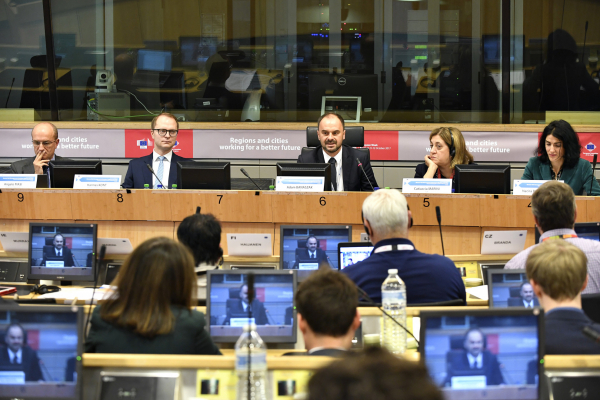Protecting citizens from natural disasters

Representing European local and regional government, ECR Group Members Adam Banaszak, Pavel Branda and Cllr Harvey Siggs spoke at a high-profile conference organised jointly by the United Nations and the European Committee of the Regions on the topic of disaster risk management. Speaking on behalf of the CoR, they focused on the need for more advanced planning, community-led solutions and preventative expenditure.
The ECR Group Members highlighted the fact that although natural disasters often could not be avoided, "prevention is in our hands". For this reason, they argued, EU cities and regions wanted disaster resilience to be a requirement for all EU-funded infrastructure.
Corina Cretu, the EU Commissioner for Regional Policy, commented: "Disasters can hit anywhere, anytime, and completely change our lives in one minute. Since 2005, natural disasters have cost more than EUR 100 billion across our continent. This is why the disaster risk management conference today is crucial. The EU helps its cities to be better prepared: Cohesion policy alone offers EUR 8 billion in the current financial period for climate-change adaptation and risk prevention. However, the keyword is experience-sharing, especially in terms of prevention and preparedness. When cities talk to each other, Europe becomes safer and stronger".
The Commissioner's message was reinforced by Dr Pavel Branda (Mayor of Radlo in the Czech Republic), who underlined the importance of cross-border cooperation in preventing natural disasters. "Different laws, procedures and institutions make it particularly difficult to work together on disaster risk management in border areas. We experienced this in the region I come from when we were hit by floods. We have learnt our lesson the hard way and pooled our resources afterwards with partners from Germany and Poland so that mistakes are not repeated. Thanks to an online system which helps our border regions to exchange information and to prevent floods, our citizens can now feel safer".
Making the link with technology, Cllr Harvey Siggs commented that "despite technological advances, it remains a great challenge to truly make our cities and regions more crisis resilient". Solving such problems required not only money, but also the help of volunteers and community organisations. "When there is an earthquake or a flood, very often more people are saved by other people who dug through the mud with their bare hands rather than by advanced machinery. We cannot forget about community-based preparedness. The best results are achieved when there is effective coordination between citizens, civil society groups and local, regional and national authorities".
Adam Banaszak, ECR rapporteur on the Action Plan on the Sendai Framework for Disaster Risk Reduction and Vice-President of Kujawsko-Pomorskie region in Poland, where thousands of homes were damaged by storms in August 2017, added that another crucial aspect was to ensure that all public money invested locally was cost-efficient and did not put the lives of citizens at risk. "All EU investments relating to construction of new infrastructure must be disaster resilient. While this may entail greater costs in the short term, a number of studies have shown that it is far more cost-efficient overall to build disaster resilient infrastructure than to renovate unsafe structures".

